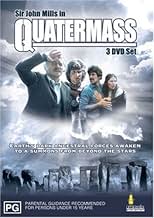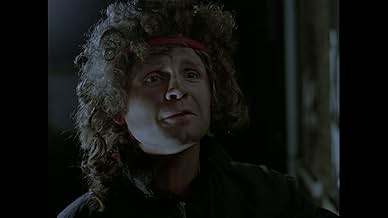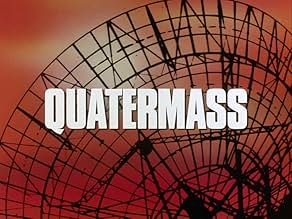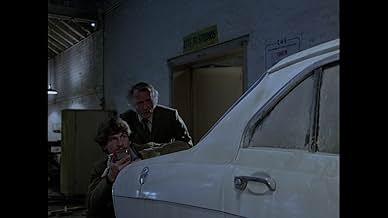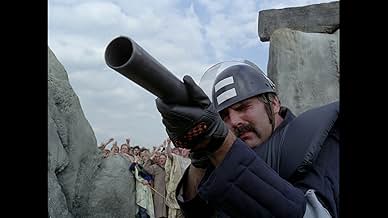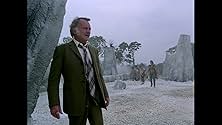In the distant future, a now-elderly Bernard Quatermass investigates the disappearance of his granddaughter and a mysterious cult.In the distant future, a now-elderly Bernard Quatermass investigates the disappearance of his granddaughter and a mysterious cult.In the distant future, a now-elderly Bernard Quatermass investigates the disappearance of his granddaughter and a mysterious cult.
Browse episodes
Featured reviews
I recently watched the complete four-hour version of Nigel Kneale's British miniseries "Quatermass." I had seen an edited movie version called "The Quatermass Conclusion" some years earlier. The verdict: The miniseries is superior. It expands on several subplots (of course) and offers richer characterizations. John Mills makes an excellent Quatermass--somewhat befuddled at the outset, but strong and clear of mind when the survival of the world is at stake. Granted, the production is not as polished as the movie version of "Quatermass and the Pit" (the music, in particular, sounds like it costs a couple of hundred bucks). But the ideas are intriguing and that darn nursery rhyme about Ringstone Round is still running around my brain. Kneale wrote a novelization of the miniseries that clarifies a few vague points.
I first saw this TV series as young child and it scared the hell out of me. Having recently watched it again 38 years later I was amazed at how good it still is. The TV acting is stilted in places but it's budget was used to good effect to produce a world steeped in chaos and slipping towards an abyss. I certainly think the 2006 film 'Children of Men' was inspired in part by this mini-series.
Central to the plot is professor Quatermass who is called back from disgrace to investigate the mass extermination of young people at pre-historic sites around the world. The budget barely stretches to evoke all this, but none the less it delivers and the drama and sense of urgency in Quatermass is palpable.
What ultimately is examined is the sense of growing alarm and division between the older generation and the new age generation that emerged in the 1960's and evolved into Punk in the 70's. The film brackets this generational divide in a story that is compelling and tragic, and it has to be said the series wisely chooses to concentrate on the gravity and graveness of the situation rather than cheap mawkishness.
Secondary characters in Quatermass are deployed to good effect, and modern film makers should take note about how such characters can be used to fill out a plot and create interesting characters, rather than props or dumb cannon fodder. They are used well to bolster the sense of discovery and revelation about what is happening and treated with intelligence and compassion.
Across all it's outings Quatermass has always been a work of it's time and dealt with the themes of the era each was made in. This outing is no different and indeed a generation later it's message about the dislocation between generations still resonates. Cleverly Quatermass takes this, something that is a tangible concern in the real world, as the central theme of it science fiction story. Even though it was made in 1979 my kids who watched it this time around were as impressed and disquieted as I was at there age.
John Mills is excellent as Quatermass. Embracing his role he obviously drew on his age and paternal experience to inject the famous scientist with pathos and real focus.
There are stilted moments in Quatermass and the effects have aged a lot. But none of that can detract from a fine and brave science fiction mini-series.
Central to the plot is professor Quatermass who is called back from disgrace to investigate the mass extermination of young people at pre-historic sites around the world. The budget barely stretches to evoke all this, but none the less it delivers and the drama and sense of urgency in Quatermass is palpable.
What ultimately is examined is the sense of growing alarm and division between the older generation and the new age generation that emerged in the 1960's and evolved into Punk in the 70's. The film brackets this generational divide in a story that is compelling and tragic, and it has to be said the series wisely chooses to concentrate on the gravity and graveness of the situation rather than cheap mawkishness.
Secondary characters in Quatermass are deployed to good effect, and modern film makers should take note about how such characters can be used to fill out a plot and create interesting characters, rather than props or dumb cannon fodder. They are used well to bolster the sense of discovery and revelation about what is happening and treated with intelligence and compassion.
Across all it's outings Quatermass has always been a work of it's time and dealt with the themes of the era each was made in. This outing is no different and indeed a generation later it's message about the dislocation between generations still resonates. Cleverly Quatermass takes this, something that is a tangible concern in the real world, as the central theme of it science fiction story. Even though it was made in 1979 my kids who watched it this time around were as impressed and disquieted as I was at there age.
John Mills is excellent as Quatermass. Embracing his role he obviously drew on his age and paternal experience to inject the famous scientist with pathos and real focus.
There are stilted moments in Quatermass and the effects have aged a lot. But none of that can detract from a fine and brave science fiction mini-series.
The Quatermass Conclusion deals with an alien machine returning to the Earth after five thousand years to 'harvest' and stir-up the glandular secretions of humans which it then uses for it's own ends. Set in a near-future (in the 70s when it was released), the scene is an anarchistic, broken-down and violent vision of Britain, but none of the little touches are over the top enough to be classed as impossible. Prince Charles is on the throne, cars have number plates with 'v' on them and the Metropolitain Police are now privately contracted. Street crime, muggings and overall disorder are all the people know (oh no, it's all coming true!!) When the alien presence is identified as a threat rather than a religious saviour in a chilling Nigel Kneale trademark 'revelation of terror': the body parts in the ashes at Ringstone Round, Quatermass is employed in his quite usual role of leading science against politicians and the military machine to engage the menace. This seems to perk him up a little, when we see him first he is an old man broken down by the anarchy of society, depressed also that his work with the rocket group ended up being misused only for military ends. This is a very bleak piece which would depress viewers if it wasn't so busy chilling and terrifying the hell out if them with trademark Nigel Kneale 'terror revelations' and extremely succinct scientific concepts and valid predictions. Not only that, but it lays claim to having the most chilling and atmospherically terrifying aspect of all of the Quatermass films and serials, the spine-tingling refrain of 'huffity-puffity Ringstone Round'. I always only ever thought there were three Quatermass serials, Xperiment, II and Pit, up until about 4 years ago, when a conversation in a pub about there being another where 'people were being drawn to Stonehenge to be eaten' put me on the trail of this, and the first time I managed to get to see it after this revelation my blood ran cold at that nursery rhyme. I had a shudder just then recalling it.
You have to hand it to Nigel Kneale.... Even after all these years, his works still have the power to leave you feeling just a bit disturbed. Not in the out and out conventions of most horror/sci-fi titles, but with the underlying neuroses and paranoias that afflict all societies, regardless of culture.
All of the Quatermass serials contained these elements, so much so that they were practically strip-mined by The X Files. And so, regardless of the quaint anachronisms that they contain, they still, somehow, manage to retain something for the modern viewer.
The 1970's Quatermass series is the most anachronistic of all, because it is so unlike the earlier serials (produced in the 50's and 60's, as were the film versions of said series). This makes the aesthetic of the series so much more nihilistic. Made under the backdrop of the (then) rising punk scene, the random violence and criminal behaviour that is portrayed must have seemed entirely topical. Even the relative cheapness of the production adds to this aesthetic: so very 70's Brit sci-fi.
But the series was written back in the late 60's, originally intended to be the 4th film in the movie series (especially with the relative success of the "Quatermass and the Pit" film). This is why we have the strange interbreeding of hippy culture and guns....
As such, you have to say that Kneale was certainly visionary in that oh-so grim British way.... And the concept that human beings might be hardwired to seek out destructive (even genocidal) religious ideals (by unseen, advanced intelligences), capable of being intensified remotely for "harvesting" (for reasons unknown), certainly has a lot of resonance in today's world.
The acting in the series was variable (understandable for a TV series). John Mills is capable as the aging and (initially) confused Quatermass, desperately seeking his granddaughter in a world that seems to be falling apart. Once the threat is recognised, the scientist in him takes over, leading to a slow and tragic conclusion.
Simon McCorkindale, an actor who seemed to be on top of his game at this time, ably plays Quatermass's sidekick, Joe Kapp. Never the safest thing to be in any Quatermass serial, Kapp is taken through the emotional wringer in ways too horrible for a husband and father to bear, before facing the fate of sidekicks before him.
Bruce Purchase and David Yip provide temporary interest (never destined to be long-lived in a Quatermass serial).
On the flipside, Ralph Arliss is quite painful as the murderous (and annoying) Kickalong, whose fate is far too kind (and long in waiting). There is an earlier scene where a group of the planet people are massacred whilst walking between rival gangs having a shootout. Something like that would have been more appropriate for Kickalong, but it was, sadly, not to be....
The effects are of a pretty low standard, but given everything else, this doesn't really seem to matter. Given the cheap, 70's budget the producers had to work with (we certainly aren't looking at a Space: 1999 cashflow here), they managed to perform miracles.
I remember first watching this some time in the 80's (I'm not sure when precisely) on late-night TV. The darkly-nihilistic atmosphere of the series attracted me to it, then, because it was so different to other sci-fi shows going around. Years later I still find it strangely appealing, even with the faults of its age.
All of the Quatermass serials contained these elements, so much so that they were practically strip-mined by The X Files. And so, regardless of the quaint anachronisms that they contain, they still, somehow, manage to retain something for the modern viewer.
The 1970's Quatermass series is the most anachronistic of all, because it is so unlike the earlier serials (produced in the 50's and 60's, as were the film versions of said series). This makes the aesthetic of the series so much more nihilistic. Made under the backdrop of the (then) rising punk scene, the random violence and criminal behaviour that is portrayed must have seemed entirely topical. Even the relative cheapness of the production adds to this aesthetic: so very 70's Brit sci-fi.
But the series was written back in the late 60's, originally intended to be the 4th film in the movie series (especially with the relative success of the "Quatermass and the Pit" film). This is why we have the strange interbreeding of hippy culture and guns....
As such, you have to say that Kneale was certainly visionary in that oh-so grim British way.... And the concept that human beings might be hardwired to seek out destructive (even genocidal) religious ideals (by unseen, advanced intelligences), capable of being intensified remotely for "harvesting" (for reasons unknown), certainly has a lot of resonance in today's world.
The acting in the series was variable (understandable for a TV series). John Mills is capable as the aging and (initially) confused Quatermass, desperately seeking his granddaughter in a world that seems to be falling apart. Once the threat is recognised, the scientist in him takes over, leading to a slow and tragic conclusion.
Simon McCorkindale, an actor who seemed to be on top of his game at this time, ably plays Quatermass's sidekick, Joe Kapp. Never the safest thing to be in any Quatermass serial, Kapp is taken through the emotional wringer in ways too horrible for a husband and father to bear, before facing the fate of sidekicks before him.
Bruce Purchase and David Yip provide temporary interest (never destined to be long-lived in a Quatermass serial).
On the flipside, Ralph Arliss is quite painful as the murderous (and annoying) Kickalong, whose fate is far too kind (and long in waiting). There is an earlier scene where a group of the planet people are massacred whilst walking between rival gangs having a shootout. Something like that would have been more appropriate for Kickalong, but it was, sadly, not to be....
The effects are of a pretty low standard, but given everything else, this doesn't really seem to matter. Given the cheap, 70's budget the producers had to work with (we certainly aren't looking at a Space: 1999 cashflow here), they managed to perform miracles.
I remember first watching this some time in the 80's (I'm not sure when precisely) on late-night TV. The darkly-nihilistic atmosphere of the series attracted me to it, then, because it was so different to other sci-fi shows going around. Years later I still find it strangely appealing, even with the faults of its age.
"The Quatermass Conclusion" is one of the few 'true' pieces of science fiction ever committed to film and Nigel Neale's script rates up there with "2001" and "Dark Star" for inventiveness. Unfortunately it suffered from an obviously low budget and there are lapses here and there into melodrama. The story, set in a dystopian Britain, concerns the arrival of an unknown alien force which is 'harvesting' the youth by leading them to ancient ritual sites. Professor Quatermass (John Mills) comes out of retirement to look for his missing granddaughter and is drawn into the fight to save the planet's population. There are some disturbing images such as Wembley Stadium reduced to a 'killing ground' and the pensioners forced to live underground for safety. Many of the predictions in the film have since come about, such as the upsurge in 'hippy travellers' and the general social decay of the inner cities.
Did you know
- TriviaStarted life in 1973 as a BBC series called "Quatermass IV". It had been commissioned by Head of Drama Ronald Marsh, and according to Nigel Kneale, the intended producer was Joe Waters. Some model test sequences of the space station were shot, but eventually, the project was abandoned by the BBC. ITV then picked it up a few years later and produced it in association with Euston Films.
- Alternate versionsThis has been made available in the United States in two versions. It was first released edited down to a 105 minute feature film under the title The Quatermass Conclusion (1979). In 2003 the complete program was released on home video under the title "Quatermass" with a listed running time of 240 minutes.
- ConnectionsEdited into The Quatermass Conclusion (1979)
- How many seasons does Quatermass have?Powered by Alexa
Details
Contribute to this page
Suggest an edit or add missing content


